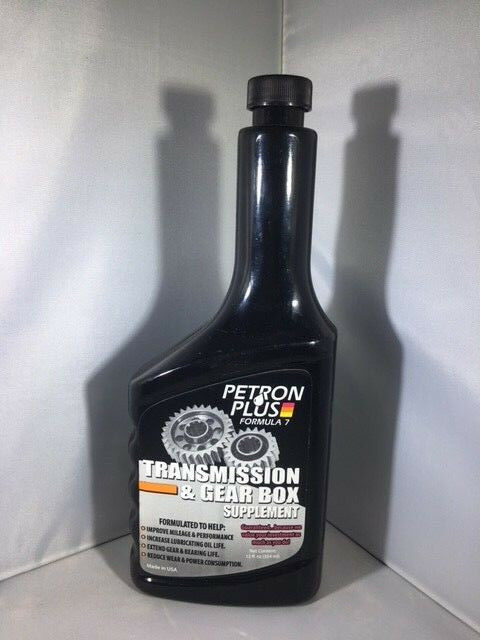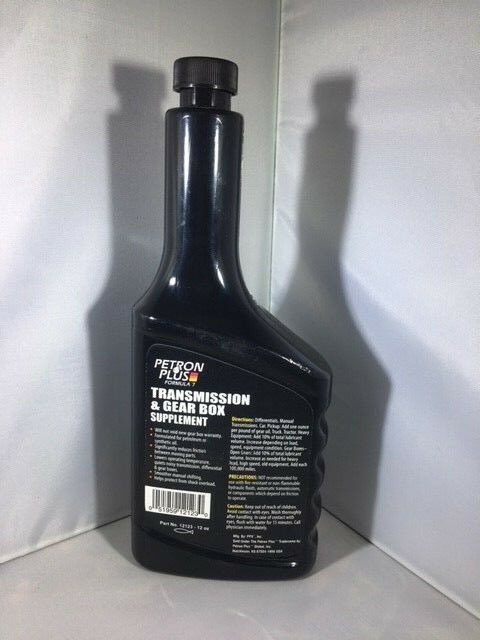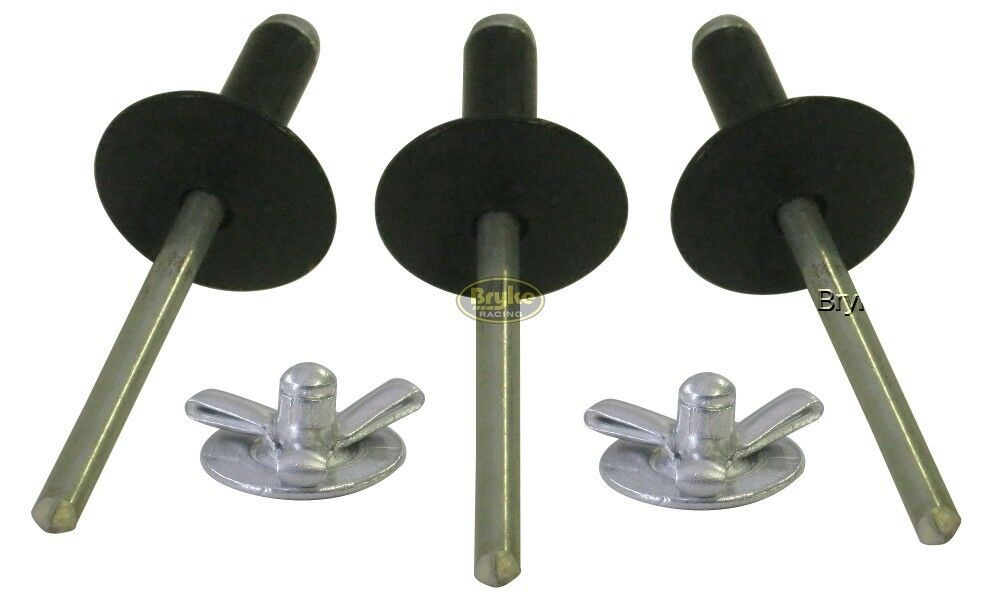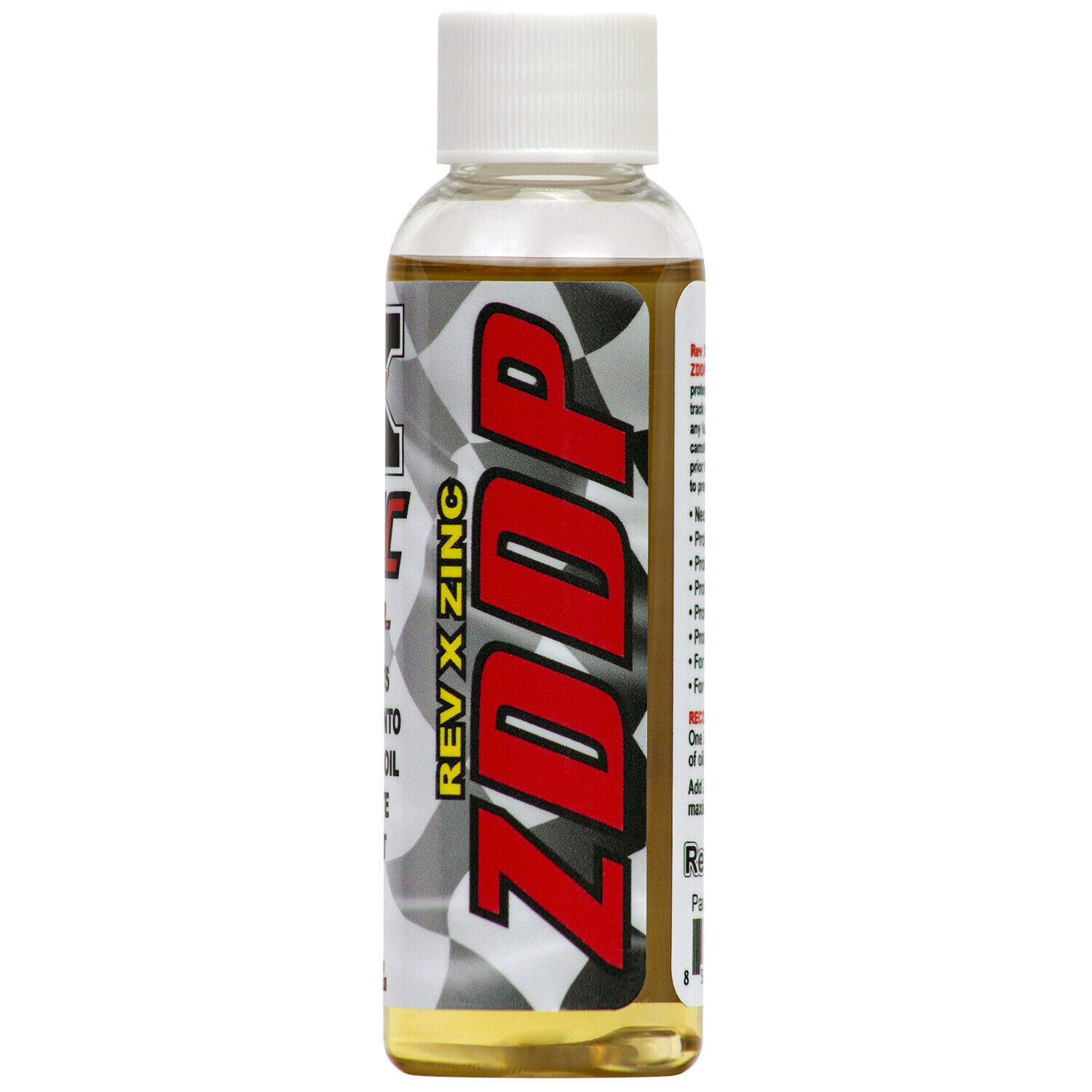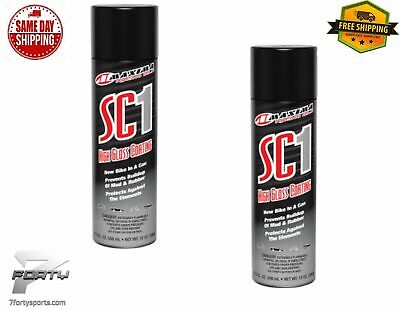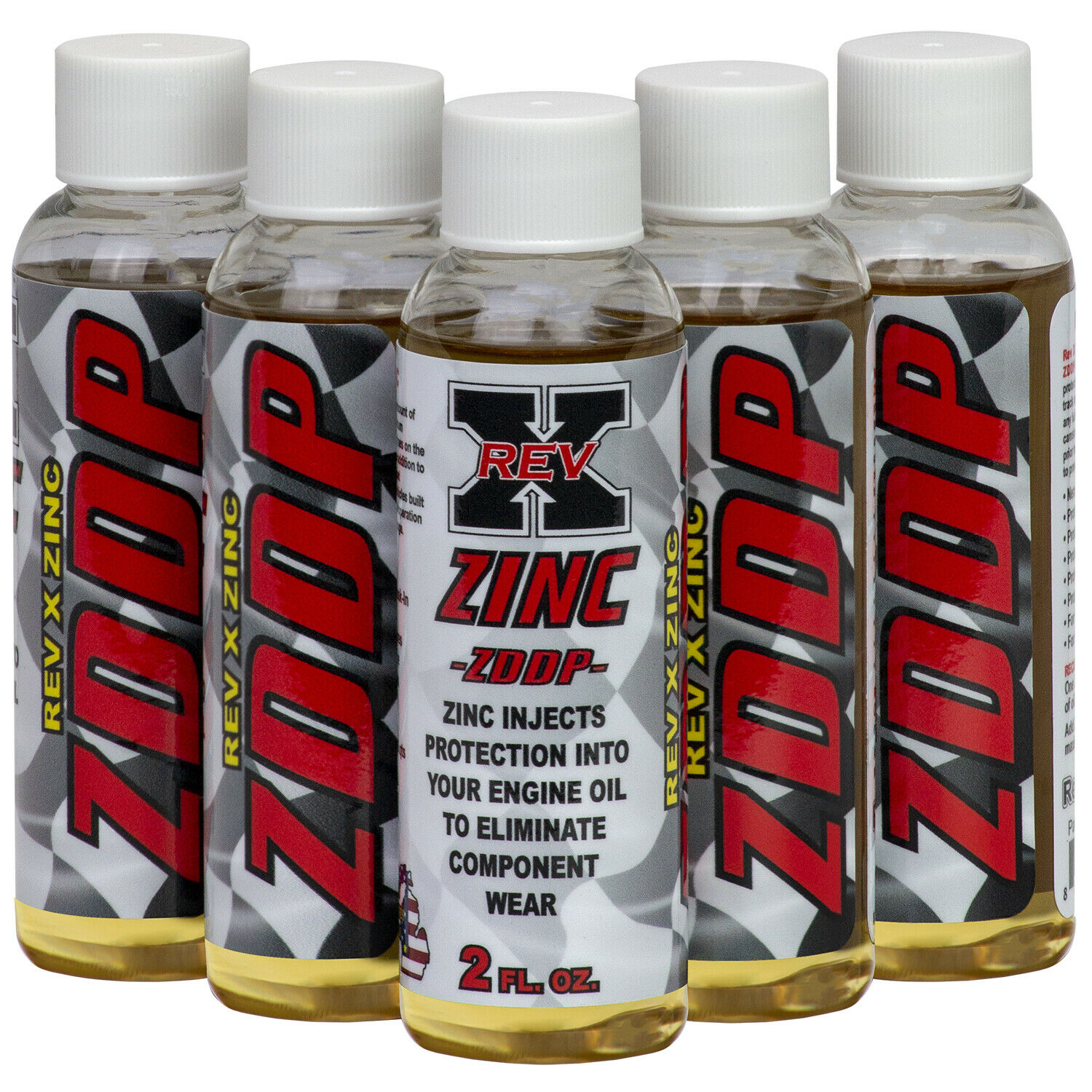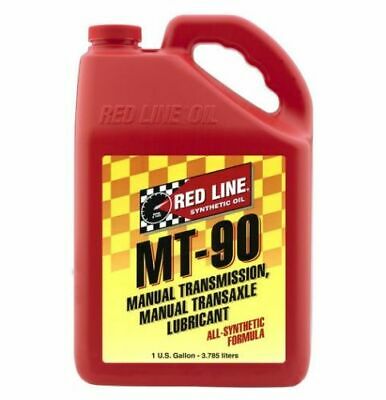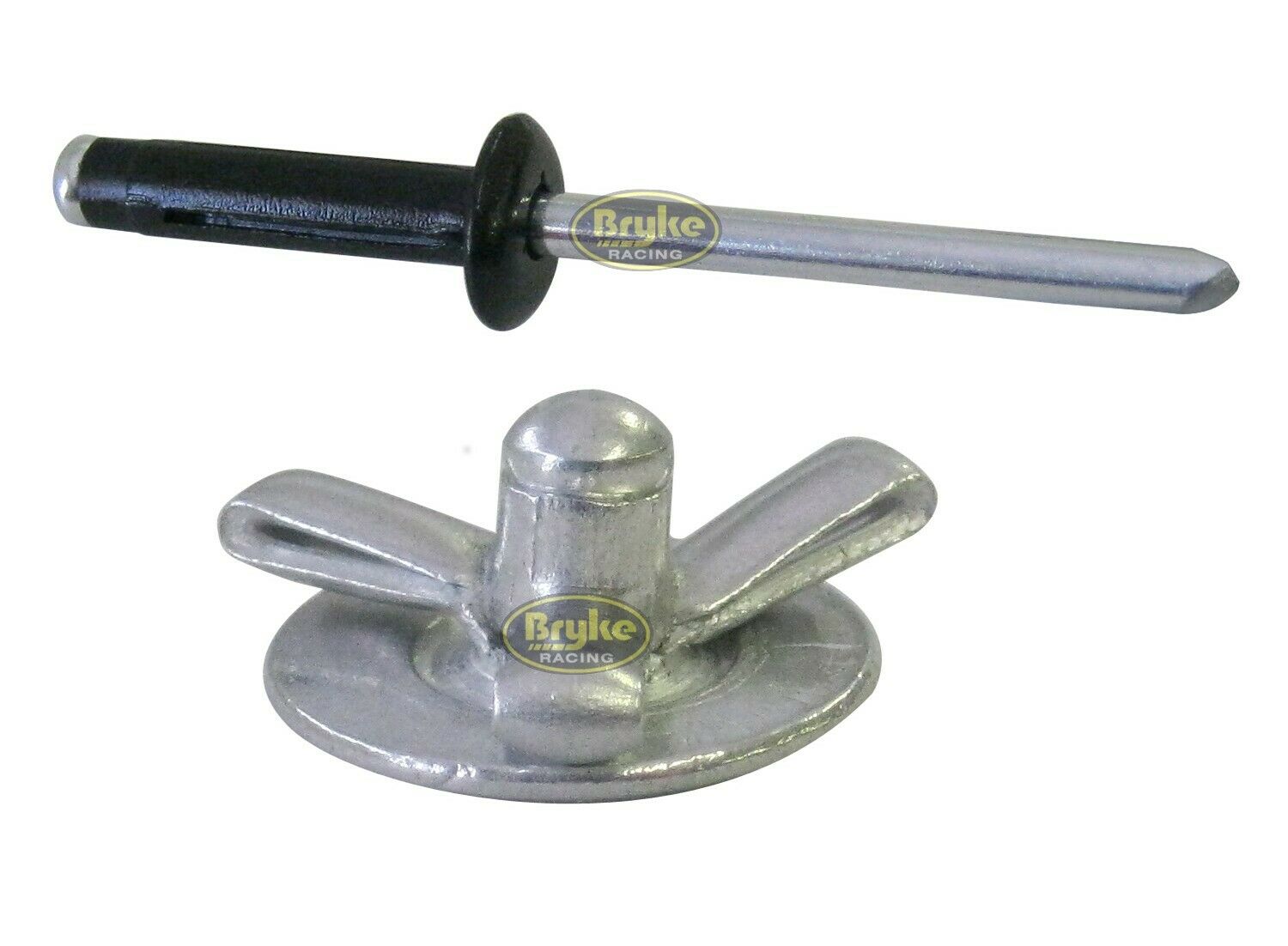-40%
Petron Plus Transmission & Gear Box; Friction Reducer
$ 34.29
- Description
- Size Guide
Description
(1) 12oz. bottle, treats a standard size manual transmission, usually 10% by volume of oil in the transmission (5 qrts)Petron Plus Formula 7 Transmission & Gear Box Supplement. Will not void warranty. Formulated for petroleum or synthetic oil. Significantly reduces friction between moving parts. Increases fuel mileage. Improve horsepower performance. Reduces oil consumption. Lowers operating temperature. Conditions seals. Reduce wear. Protect against acid & corrosion. Quiets noisy engines. Start quicker in cold weather.
Petron Plus Formula 7 Nano Monomolecular technology is 0.1 micron in size. When Petron Plus Formula 7 is added to an existing lubricant, tiny molecules (less than 1 micron in diameter) are carried directly to the friction face. Because the molecules are very small, 0.1 in size (a human hair is 50 microns). Solid additives (i.e., PTFE, Teflon (a registered trademark of DuPont), Moly, Graphite, etc.) are 2 to 10 microns in size. The Petron Plus Formula 7 technology is much the size of a cold virus, and in that conjunction can’t be stopped.
Once the molecules reach the friction face, they are attracted to the surface, thereby reducing friction, wear and drag. The Petron Plus Formula 7 Nano Monomolecular technology contains none of the common EP agents such as molybdenum disulfide (Moly), graphite, Teflon, or PTFE resins, copper, lead, silver, or other metals, nor other previously used EP agents. It doesn’t contain Carbon Tetrachloride, 1,1,1, Trichloroethane, or Chlorinated Paraffin, or Chlorinated Solvents or any other harmful solvent. The Petron Plus Formula 7 Nano Monomolecular lubricant technology is about to revolutionize the design and performance of wear components, thanks to the extremely high shear strength of the re-engineered hydrocarbon. Once there, intermolecular force pulls the molecules to the surface where they cluster to fill in any pores or roughness. The remaining areas are covered by a layer less than one molecule deep, hence the term Nano Monomolecular. The intense shear strength of these microscopic layers provides outstanding smooth running and reduced friction characteristics, under the most demanding conditions even the most advanced EP lubricants fail to meet. To dispel fear that this new technology is just another ‘snake oil’, the most demanding tests have been used, and are still used when testing these products. Application areas in the industrial sector includes; high power density hydraulic systems, gear boxes in mining, automotive, commercial vehicles to the largest gear boxes in the world; mining, construction and manufacturing plants and agricultural equipment;
all types of engines from gasoline, diesel, propane to marine engines; as well as chains, bearings and other types of mechanized systems, including major cities, states, and the US government; A test conducted inside the Tsingtao City Development Zone’s bus company, selected five big buses and added the new technology to the buses. Following strict experimental standards the test allowed no adjustments to the buses. The results showed “Fuel consumption went from 15 liters before the new technology products were added down to 12.14 liters after the new technology products were added. This was a fuel consumption drop of 19%. Five buses following the same testing procedures and had an average fuel savings of 16.2% and the operating conditions improved dramatically. Engine noise was cut down; lube oil consumption dropped 50% and emissions dropped significantly.” In another test in a similar
experiment using a Toyota car, the results they observed showed a “25 liter savings in fuel consumption in a drive from Shengyang to Dailin.” That was a savings of 17.9%.
About Petron and Lubricant Solutions LLC:
NANO MONOMOLECULAR
Wanted: Lubricant, & Chemical Magic ---
To Solve Emissions & Environment Problems,
Plus Hi-Tech Lubricants for Today’s Special
Vehicle and Equipment Needs
Lubricants are a necessity for any one who owns a vehicle, equipment or plant. Across the globe, vehicle, equipment and
plant owners are searching for better solutions to vehicles, equipment and plant emissions and lubrication problems.
They want lubricants that will help reduce emissions, and smog problems.
They want lubricants that won’t cause production interruptions for unscheduled maintenance, and they want those
chemicals, and lubricants very fast
.
There is a line of high-tech chemicals and lubricants that helps to reduce friction and wear, and provides rust, and corrosion
protection far beyond anything available in today’s automotive, commercial and industrial markets called
Petron
Plus Formula 7
.
They include a complete line of fuel products for gasoline and diesel fuel for the automotive aftermarket, fleet bulk storage
tanks, pipe line, all the way to the refineries. They also offer a revolutionary line of supplement products; they are a
synthetic to semi-synthetic based line of products that can be used with most oils and lubricants.
Theses products are not an oil additive, nor a replacement petroleum product, but patented high-tech semi-synthetic
constituents chemically bonded together in a patented/patent pending new process to form a totally new Extreme Pressure
(EP) ingredient.
The solid products are 2 to 10 microns in size;
Petron Plus Formula 7 Nano Monomolecular technology is 0.1 micron in size
.
When Petron Plus Formula 7 is added to an existing lubricant, tiny molecules (less than 1 micron in diameter) are carried directly
to the friction face. Because the molecules are very small,
0.1 in size
(a human hair is 50 microns). Solid additives (i.e., PTFE, Teflon
(a registered trademark of DuPont), Moly, Graphite, etc.) are 2 to 10 microns in size.
The Petron Plus Formula 7 technology is
much the size of a cold virus, and in that conjunction can’t be stopped
.
Once the molecules reach the friction face, they are attracted to the surface, thereby reducing friction, wear and drag.
The Petron
Plus Formula 7 Nano Monomolecular technology contains none of the common EP agents
such as molybdenum disulfide (Moly),
graphite, Teflon, or PTFE resins, copper, lead, silver, or other metals, nor other previously used EP agents. It doesn’t contain
Carbon Tetrachloride, 1,1,1, Trichloroethane, or Chlorinated Paraffin, or Chlorinated Solvents or any other harmful solvent.
The
Petron Plus Formula 7 Nano Monomolecular lubricant technology is about to revolutionize the design and performance of
wear components
, thanks to the extremely high shear strength of the re-engineered hydrocarbon.
Once there, intermolecular force pulls the molecules to the surface where they cluster to fill in any pores or roughness. The remaining
areas are covered by a layer less than one molecule deep,
hence the term Nano Monomolecular
.
The intense shear strength of these microscopic layers provides outstanding smooth running and reduced friction characteristics,
under the most demanding conditions even the most advanced EP lubricants fail to meet. To dispel fear that this new technology is
just another ‘snake oil’, the most demanding tests have been used, and are still used when testing these products.
Application areas in the industrial sector includes; high power density hydraulic systems, gear boxes in mining, automotive, commercial
vehicles to the largest gear boxes in the world; mining, construction and manufacturing plants and agricultural equipment;
all types of engines from gasoline, diesel, propane to marine engines; as well as chains, bearings and other types of mechanized
systems, including major cities, states, and the US government; A
test conducted inside the Tsingtao City Development Zone’s bus company,
selected five big buses and added the new technology to the buses. Following
strict experimental standards the test allowed no adjustments to the
buses. The results showed “Fuel consumption went from 15 liters before
the new technology products were added down to 12.14 liters after the
new technology products were added. This was
a fuel consumption drop
of 19%
. Five buses following the same testing procedures and
had an average
fuel savings of 16.2% and the operating conditions improved dramatically
.
Engine noise was cut down; lube oil consumption dropped
50% and emissions dropped significantly
.” In another test in a similar
experiment using a Toyota car, the results they observed showed a
“25
liter savings in fuel consumption
in a drive from Shengyang to Dailin.”
That was a savings of 17.9%
.
In applications like these in China, US, and some of the largest companies in Europe, the new technology has routinely resulted in
improved performance such as 15-20 percent reduction in temperature, 10-20 percent reduction in power consumption, up to 10
percent reduction in operating noise and up to 50 percent increase in maintenance intervals.
A European tractor manufacture
saw between a 10% to 24% reduction in power
on a paint shop conveyor after the new technology
product was applied to the conveyor chain links,
lubrication went from once a week to every two weeks
. An
Automotive Exhaust Manufacture in South Wales
saved £67,401.60 (pounds not dollars) in one year
by applying
a new technology product to a Cam Follower Bearings in a Silencer Box End Seamer. The new technology
product had extended the bearing life from one month to three months without failure. A major grain company
in the United States
reported a 16% reduction in amp load
, and saw a temperature drop after a new technology
product was added to an elevator gearbox that was over-heating.
A cement plant in the mid-west region of the U.S. relates its first application of one of the new technology supplement product when
they had a major failure of its #2 trunnion bearing. The trunnion shaft was badly cut, the plant
manger reported. They had been planning a winter outage, but it was not scheduled until March.
The trunnion changout would take several days. They took a change. He had the failed bearing
replaced, and left the trunnion, which weights about 50 tons, in place. At which time they added one
of the new technology products to the high-pressure lube system.
The trunnion bearing lasted until
the scheduled outage
. The plant manager stated: “you probably can’t fathom how significant that
was, because the scored trunnion shaft and bearing probably wouldn’t normally have held up for
more than several hours of operation”. When they dismantled the trunnion assembly, a representative
from manufacture was present. He couldn’t believe what he saw.
The bearing under the scored
shaft did not have a mark on it
.
The plant maintenance supervisor reported that they have many Falk gearboxes operating in very dusty environment. Temperatures
can vary considerably from very cool to very hot. He said; they have found that the new technology product improves gear lubricatiotion,
smoothes everything out, and helps us to avoid problems.
For example, a large Falk gearbox, which drives a roll grinding mill, is about 30 feet long, 14 feet wide and holds 1,050 gallons of gear
oil. They filled the gearbox with a mixture of 85% regular gear oil and 15% of the new technology product. Almost immediately they
saw a decrease in amperage, and they saved energy, plus the unit’s overall smoothness had improved
. Similarly, a critical conveyor is
equipped with another large Falk gearbox. Before using the new technology product, they were having bearing or a gear problem
every two years.
Since they began adding the supplements, all their annual inspections have checked out fine
. The inspection is performed
by the gearbox manufacture with the cement company personnel.
In another example, they had a mechanical problem with a gearbox that had been in the plant for a number
of years. It had lost an upper thrust bearing and damaged the boiler box. When the company went on to a
refit, it
saw a significant decrease in amperage when the gearbox ran on oil and one of the new technology
supplement mixture
, even though the mechanical work was incomplete. The improvement in performance
was even greater once the unit had been repaired.
As a result of this experience,
they decided to use the supplement in every critical gearbox, and since they are a seven-day-a-week, 365
day-a-year operations, and shut down only for emergencies, this practice has helped them avoid unnecessary downtime
.
They have also used the new technology product on their rotary kiln. The kiln is about 14-½ feet in diameter
and 350 feet long, making it among the largest pieces of moving equipment used in any manufacturing operation.
To thoroughly expose the raw materials to the high temperatures, the kiln rotates at approximately 120-
130 revolutions per hour. The rotary kiln rests on three main piers, with two bearings at each pier supporting
the kiln as it rotates. The supports at piers 1 and 2 are 21” diameter shelves running in 21” bearings.
Pier 2 is a 26” shelf running in a 26” bearing. All the bearings are heavily loaded as the raw material moves
slowly through the kiln.
The bearings are inspected on an annual basis.
They have seen an improved finish on the brass bearing surface and the shaft since
they began using the new technology products
. The thrust plates are cleaner and better polished, and the overall bearing condition
has improved.
A raw mill I.D. fan is another application. This fan ran with a slightly scored shaft and pulled babbit for two
months after maintenance personnel made
an emergency application of the new technology product into the lube
system to try and hold off further deterioration and a sudden unscheduled shutdown
. At a programmed time,
the bearing was changed and the shaft left in place. The shaft was found to be sooth and undamaged from the
day that the oil had been fortified with the supplement.
They also found one of the new technology products to be a great benefit to the plant’s clinker production and cooling operation. In
the production process, a mixture of finely ground limestone, clay and gypsum, heated to about 2700°F, emerges as clinker and drops
into a cooler, where it is cooled by a series of eight induced draft fans. An automated lubricating system feeds grease to the 2 fan bearings
at preset intervals. The bearings are expensive; however, the cost of the bearings failure and replacement is only part of the
problem. Any time that a bearing fails it shuts down the main clinker production line.
As a result, cost reduction is less a matter of
bearing replacement than it is of reducing the amount of downtime
.
“Since they began using one of the new technology products on their cooler fans and bearings,
the replacement rate has dropped by at
least 50%”, their maintenance supervisor reported
. “
We had a record of years of bearing replacement, so that when we changed the
lubricant and the bearing replacement rate declined, the improvement was obvious
.”
In the automotive racing world the reports have been just as dramatic.
One
race team reported a four (4%) percent increase in horse power from 1,290
H.P. to 1,340 to 1,340 H.P. on a dyno test after the new technology product was
added to the engine oil
, this was done after they had made all their adjustments
and settings.
The above picture resembles the metal surfaces in an engine. Solids only protect your engine on minimum levels. The Petron Plus
Formula 7 technology literally impregnates the metal surfaces of your engine, the same holds true when applied to gear oils in gearboxes,
and hydraulic fluids, etc.
A highly
respected independent research and testing laboratory in San Antonio, Texas, regularly conducts competitive performance
tests
on these new technology products.
These test are the most stringent for a products of this type, and consistent results demonstrate that they exceed the performance of all
competitors and significantly enhanced the performance characteristics of the high quality lubricants.
With the price of crude oil a few months ago over one hundred forty US dollars per barrel, the price of chemicals
and lubricants surely will be affected. But, with quality and high productivity back in style in the US, manufacturers
cannot afford to slow down or shut down for the lack of adequate chemicals or lubricants. Neither can they
stand to lose any chance of a competitive edge over growing foreign industries.
The new technology helps reduce emission, smog, thereby keeps the environment cleaner.
It reduces maintenance downtime, labor, and parts replacement costs
.
Helps to increase overall efficiency and productivity of operating
equipment
.
It also increases the life of the base lubricant thereby decreases drain intervals
.
Most users realize immediate multiple benefits when new technology products are introduced into a broad range of machinery, equipment,
or vehicle applications:
-
Helps substantial to increase equipment-operating life, with consistent "like new" performance
.
-
Helps to decrease energy or fuel required for normal equipment operation
.
-
Helps to increase horsepower and performance output, even under high load, high performance demands
.
-
Helps to decrease operating temperatures in gearboxes, bearing housing and engines
.
-
Helps to keep lubricant contamination in suspension, thereby increasing lubricant life
.
-
Helps increase the ability of base lubricants to prevent rust and corrosion, resist oxidation
.
-
Helps reduce emissions, smog, thereby keeping the environment cleaner
.
-
Helps to significantly reduce maintenance downtime, labor, and parts replacement costs
.
-
Helps to increase overall efficiency and productivity of operating equipment
.
-
Helps to increase base lubricant life, thereby decrease drain intervals
.
-
Helps to increase profitability for plants operating the equipment and utilizing Petron Plus Products
.
To stay competitive, fleets, and industries must look to both the oil giants of the world and to small, specialty lubricant, additive
and/or chemical manufacturers for solutions to their needs. Old-line additive manufactures--as well as newer companies--must focus
their total resources on the research, development and implementation of proprietary chemical packages. They must address issues
concerning additives, metal treatments, lubrication, and fuel supplements that are designed specifically for future fleet, and industrial
applications.
The world’s “new-generation” lubricant, fuel-additive packages is already here and is available in supplements,
or already blended into fully formulated lubricants
.
They range from finished synthetic, non-synthetic and partial synthetic motor oils, ATF's, automotive gear oils, industrial gear oils, hydraulic fluids, compressor oils,
natural gas engine oils, automotive a/c lubes, turbine oils, refrigeration oils, natural gas compressor oils, aerosol products, greases, metalworking fluids, to EPA registered
gasoline additives and diesel fuel additives, industrial cleaning products, and automotive and fleet cooling systems cleaners and corrosion inhibitors & treatments.
Some of these products have H-1 and H-2 food grade approval by USDA. The company also has a product line that meets certain Military Specifications. As well as a
full range of Bio-Degradable products.
